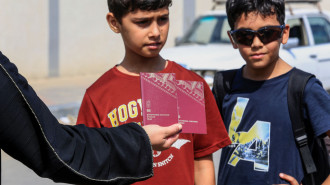'Money for freedom': Morocco's solution to prison overcrowding
Despite significant social and political opposition to the legislation, the Moroccan parliament has passed a controversial "purchase of prison days" law to curb prison overcrowding.
After nine months of consecutive discussions, on Wednesday, 4 October, Minister of Justice Abdellatif Ouahbi finally convinced the Justice and Legislation Committee of the House of Representatives to pass an amendment in the law that allows the purchase of prison days.
"We often resort to other means to alleviate pressure in prisons. With this procedure, the state treasury will benefit from additional revenues," argued the justice minister during the session, according to local media.
It was passed with the approval of 18 representatives, while eight representatives opposed it.
Based on the new amendment, convicts sentenced to less than five years can stay out of prison by paying a daily fine, ranging from 100 dirhams (US$10) to 2,000 dirhams (US$200), for each day of the imposed prison sentence.
The court will consider the financial capabilities of the convicted person, their financial obligations, the seriousness of the committed crime and the resulting damage.
Minors can also benefit from the new law with the consent of their guardian or representative.
"Purchase of prison days" can only be imposed after reconciliation or a waiver issued by the victim or their relatives or when the convicted person compensates for or repairs the damage resulting from the crime.
As stipulated in the draft law, alternative penalties include working for public benefit, electronic monitoring through electronic ankle bracelets, and restricting certain rights. These penalties apply to misdemeanours with fewer than five years of prison.
The new law was drafted to curb the overcrowding in Moroccan prisons, which reached its peak in 2022 with a record number of 100,004 detainees in 75 "correctional facilities," according to the Moroccan General Delegation for Penitentiary Administration and Reintegration (DGAPR).
The capacity of Moroccan correctional facilities is only 64,600 beds. The local prison in Ain Sebaâ, Casablanca, alone, houses 10,877 detainees for 3,800 beds.
However, since Minister Ouahbi first suggested the law in January, it has stirred nationwide controversy, with many deeming it classist and exclusive of individuals from disadvantaged socioeconomic backgrounds.
There is a well-established relationship between poverty and incarceration.
While there are no reports on Morocco's case in particular, a report by the US-based Institute for Research on Poverty has proved that people from disadvantaged backgrounds have limited access to resources and opportunities, which leads, in many cases, to resort to illegal activities.
Meanwhile, the lack of funds can hinder their ability to hire competent lawyers, navigate the legal system effectively, or post bail, potentially leading to more extended periods of pretrial detention.
Poverty is not only a predictor of involvement with the justice system. Too often, it is also the outcome. According to another report by the Prison Policy Centre, a criminal record does lifetime collateral damage, hindering poor people's chances of accessing job opportunities.
While it's important to note that the issue is complex and influenced by various factors, many commentators see the new law as an unnecessary addition to an already flawed global judicial system.
However, Minister Abdellatif Ouahbi has defended relentlessly his amendment, saying, "The judge will take into consideration the economic circumstances of the individual."
"Detainees cannot benefit from the procedure more than once, and they must present a reconciliation document. Therefore, we have surrounded the procedure with a set of conditions," argued the Moroccan Minister.




 Follow the Middle East's top stories in English at The New Arab on Google News
Follow the Middle East's top stories in English at The New Arab on Google News
![People gathered around the rubble of destroyed houses to search for survivors [Getty]](/sites/default/files/styles/image_330x185/public/2024-11/GettyImages-2184733820.jpg?h=199d8c1f&itok=NiM1LO2f)

